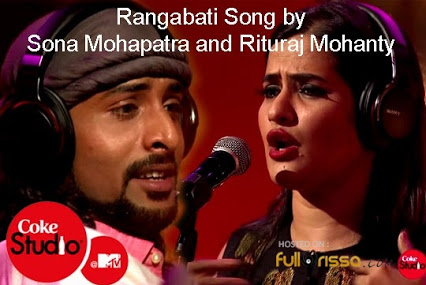 |
| image credit - Sekho.in |
Odisha has been
in the throes of cultural churning since a few weeks now. While the religious
controversy with regard to Nabakalebara of Lord Jagannath refuses to die down,
a new musical controversy pertaining to rendition of two songs by Sona
Mohapatra and Rituraj Mohanty on MTV Coke Studio has stirred a hornet’s nest.
The songs in question are the remix of a 1970’s cult number ‘Rangabati’ and the unofficial state
anthem ‘Bande Utkala Janani’. With
cases slapped for copyright violation, social media outrage and defend game in
full flow, this issue has created camps with staunch views on an otherwise
melodious affair.
The bone of
contention regarding this now with thousands of YouTube hits (2 million hits in 21 days as on 27/7/15 as tweeted by @sonamohapatra) song largely involves
five issues:
Firstly, the
original composers of the Rangabati song, lyricist Mitrabhanu Gauntia and
composer Prabhudatta Pradhan have alleged copyright violation. The Copyright
(Amended) Bill, 2010 made special provision for rights to authors of work used
in sound recordings. The bill states
that the right to loyalties rests with the creator and can be assigned to their
heirs or copyright societies.
Singer Sona
Mohapatra in an interview claimed that since the song is a folk song, there is
no question of copyright violation. The composition of Indian folk music has
always been ‘anonymous’ and has inspired or have been usurped, depending on
which side of the spectrum you stand, by composers who have commercialized
them. It is grey area since music has depended on inspirations and adaptations,
conscious or unconscious. It is interesting to note here that composer of the
new Rangabati, Ram Sampath, won
a fairy tale suit of Rs 2 crore against Rakesh Roshan for violation of
copyright. However at the end of the day, now that the matter is sub judice, it will be for the courts to
decide whether there is an actual copyright violation.
Secondly, a
section of people, particularly of Western Odisha, from where the song
originates have taken exception to a host of mispronunciation by Sona Mohapatra
which significantly alters the meaning of sections of the song. The original
song in Sambalpuri language is a love song and use of words like ‘Ranga’
repetitively, aimed at aesthetic appeal, which in actuality refers to transgender,
makes a mincemeat of the original narrative. There cannot be two thoughts on
this that the people who understand and value the language will be offended and
that the artists should have made effort to get the rendition and meaning right.
Thirdly, the
issue of the mixing of ‘Bande Utkala Janani’ towards the end of Rangabati rendition. The song was
composed by Lakhsmikanta Mohapatra in 1912 and has been the unofficial state
anthem, being sung in functions of the State and the state Assembly. This piece
of the song sung by Rawstar winner Rituraj Mohanty has come under criticism as
it has deviated from the original composition.
There is a demand by sections of society, notably the opposition
parties, to make the song as State Anthem and make its disrespect punishable.
Till the moment that happens, it should be perfectly fine to sing it in any
manner until it evokes disrespect.
Fourthly, the
politics. Nothing comes better than a good controversy to bank on. The Rangabati outrage has become fodder for
political parties who wish to claim their allegiance to the often neglected and
poverty stricken Western Odisha. Political parties of all hues have jumped into
the wagon of protesting against the song which has incidentally been greatly
liked and accepted by many, especially a huge chunk of Odia, who feel the song
received its due on a large platform. Just like the disdain that people of
Odisha have grown concerning political angle and action in the Nabakalebara
controversy, this trick by political parties, will attract the same emotion.
Fifthly, all
this hue and cry over the song has brought into focus the dilapidated state of
music in Odisha. It is not that this rendition of Rangabati is the first instance of tampering with the original.
Several hundred versions exist including ones popular in Telugu, including
scores which are distasteful and music videos of which are vulgar. Songs in
Sambalpuri language are very popular in the state but of late they have been
outright obscene and which has been incidentally objected
by Jitendra Haripal, the original singer of the famed Rangabati. So much so that the cheapness that is peddled in the
name of music stands to undo decades of great musical work by Odia artists. The
fact is, measured censorship is warranted to halt this unfortunate trend.
Rangabati is undoubtedly the most
popular song in Odisha when it comes to celebrations. Weddings are effectively
incomplete without it being played by the band while people shake a leg to it.
The song, via BBC
and Voice of America has seen unparalleled popularity. It has always been in
focus, and more so in recent times, perhaps owing to the social media
expansion. When it was announced that it would be featured on MTV Coke Studio,
the excitement of an average Odia and a music aficionado was tremendous.
However the turn of events made the experience sour for some yet enjoyable for
others. Artistic liberty and freedom has always offended some, which should be
perfectly fine in a liberal society; but with care, caution and walking by the
rules of the land and that of ethics and morality, the experience can be richer
and more meaningful.
PS: I absolutely liked the rendition and the buzz it created. Debates, in a healthy fashion, are always good, be there agreement or disagreement.
No comments:
Post a Comment
Feel free to write in...